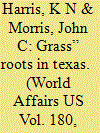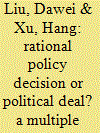| Srl | Item |
| 1 |
ID:
155591


|
|
|
|
|
| Summary/Abstract |
Several scholars have pointed to a gap between the social movement and policy literatures, and argue that the failure of each field to incorporate the other creates a missing link in our understanding of how social movements and policy shape each other. This study provides an opportunity to make these links by applying John Kingdon’s multiple streams framework of agenda setting to the marijuana movement in Texas. Texas, an unlikely candidate for marijuana reform, was the site of sustained efforts to change marijuana laws during the 2015 legislative session. This research offers evidence about the ways in which social movements influence the policy process, and how the policy process responds to activist efforts. We find that despite well-organized movement efforts, political influence was limited. We argue that the reform movement’s inability to control activist participation presents additional challenges in a nonballot initiative state such as Texas.
|
|
|
|
|
|
|
|
|
|
|
|
|
|
|
|
| 2 |
ID:
176103


|
|
|
|
|
| Summary/Abstract |
After more than twenty years of waiting, the first gas pipeline connecting Russia and China—the Power of Siberia—began transporting gas in December 2019. Although much has been discussed concerning disputes over pricing and the route of this pipeline, the relevant events inside each nation, e.g. China's energy mix transition, its gas pricing reform, the reshuffle of Russia's natural gas industry, etc., that helped catalyze the deal have yet to be fleshed out. This paper analyzes the decision-making behind the deal using the multiple streams framework (MSF) which is well suited for the examination of decision-making under circumstances of ambiguity. Our analysis demonstrates the ambiguous policymaking circumstances for the gas deal and reveals how policy disputes over price and routing paralleled and interacted with the changing political landscapes and shifting problem agendas in both nations before they were coupled together by political leaders in 2014. The insights derived here are also helpful in analyzing other cross-border pipeline deals.
|
|
|
|
|
|
|
|
|
|
|
|
|
|
|
|